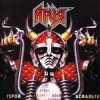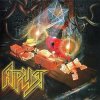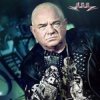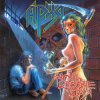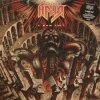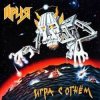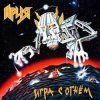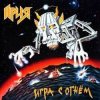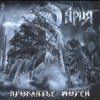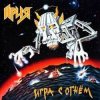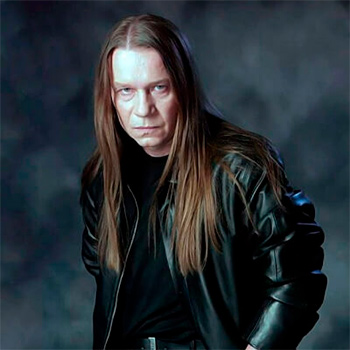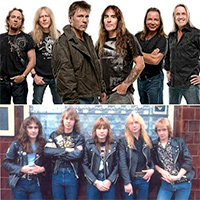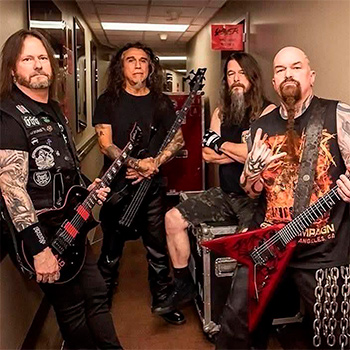

Aria — a legendary Soviet and Russian heavy metal band founded in 1985 in Moscow. It became one of the first and most successful metal bands in the USSR, paving the way for heavy music on the Russian stage. The band’s sound combines the power of classic heavy metal, philosophical lyrics, and melodic depth inspired by giants such as Iron Maiden, Judas Priest, and Black Sabbath.
Foundation and Early Years
The band was founded in the fall of 1985 by guitarists Vladimir Holstinin and Andrei Bolshakov, supported by producer Viktor Vekshtein from the “Rock Atelier” center. The original lineup also included Alexander Lvov (drums), Albert Asadullin (bass), and Aleksei Strayk (vocals). Soon, Valery Kipelov joined as the new vocalist — destined to become the voice and symbol of Aria.
The name “Aria” was proposed by Vekshtein — it had to be short, memorable, and symbolize the grandeur and power of musical art. Thus was born a name that would become iconic.
Early Success and Cult Status (1985–1990)
The debut album “Mania of Grandeur” (1985) was a sensation — one of the first Soviet releases to feature heavy metal performed with professional power and Western energy. Songs like “Torero”, “Will and Reason”, and “America Behind” gained the band a massive fanbase.
The following albums — “Who Are You With?” (1986) and especially “Hero of Asphalt” (1987) — turned Aria into a cult phenomenon. Tracks like “Street of Roses”, “1100”, and “Careless Angel” became Russian rock classics and remain staples in their live shows.
By the late 1980s, Aria was performing at major festivals across the USSR, drawing thousands of fans and shaping the first wave of Soviet metal culture.
Changes and New Heights (1990–2000)
In the early 1990s, the band underwent several lineup changes. The departure of Andrei Bolshakov and conflicts with producer Vekshtein led to reorganization. Yet Aria not only survived but released several landmark albums:
- “Playing with Fire” (1989) — more melodic and philosophical, featuring the track “Burning Arrow”.
- “Blood for Blood” (1991) — aggressive and powerful, reflecting the spirit of change.
- “The Night Is Shorter Than the Day” (1995) — an atmospheric album blending metal and lyrical elements.
- “Generator of Evil” (1998) — one of the band’s darkest and most conceptual works.
During this period, Aria solidified its status as Russia’s leading metal band, touring extensively across the CIS and Europe.
The Kipelov Era and Split (2000–2002)
The album “Chimera” (2001) became the last work of Aria’s classic lineup with Valery Kipelov. His departure in 2002, alongside drummer Alexander Manyakin and guitarist Sergey Terentyev, split the fanbase and became one of the most discussed events in Russian rock history.
However, Aria did not disband — the group preserved its spirit and energy, proving it could rise again like a phoenix.
New Lineup and Modern Era (2002–Present)
After a brief pause, the band welcomed vocalist Artur Berkut, with whom they released “Baptism by Fire” (2003) and “Armageddon” (2006). These albums showed that Aria remained relevant and continued to evolve while keeping its signature sound.
Since 2011, the microphone has belonged to Mikhail Zhitnyakov. His arrival brought new creative energy and led to a series of successful releases:
- “Phoenix” (2011) — symbolizing rebirth and renewal.
- “Through All Times” (2014) — a philosophical work about perseverance and destiny.
- “Curse of the Seas” (2018) — a conceptual album with symphonic metal elements and epic storytelling.
In the 2020s, Aria remains highly active — releasing music videos, live albums, and concert DVDs such as “Classical Aria” with a symphony orchestra and “Through All Times: Live”.
Musical Style and Philosophy
Aria’s style blends powerful guitar riffs, harmonious solos, melodic vocals, and profound lyrical content. The band’s songs explore themes of mythology, fate, war, personal freedom, and inner strength. Combining epic narrative with emotional depth, Aria forged a distinctly Russian version of classic heavy metal.
A hallmark of Aria’s creativity is its literary lyricism. Lyricists such as Mikhail Zhitnyakov, Margarita Pushkina, and Alexander Yelin contributed poetic imagery and allegory, giving the music philosophical resonance.
Current Lineup
- Mikhail Zhitnyakov — vocals (since 2011)
- Vladimir Holstinin — guitar (founding member)
- Sergey Popov — guitar (since 2002)
- Vitaly Dubinin — bass, vocals (since 1987)
- Maksim Udalov — drums (since 2002)
Former Members
- Valery Kipelov — vocals (1985–2002)
- Andrei Bolshakov — guitar (1985–1988)
- Artur Berkut — vocals (2002–2011)
- Sergey Terentyev — guitar (1997–2002)
- Alexander Manyakin — drums (1998–2002)
Achievements and Recognition
- Over 20 albums, including studio, live, and greatest hits compilations.
- More than 40 years on stage — a symbol of endurance and dedication to the genre.
- Headliners of major festivals such as Nashestvie, Kubana, Rock over the Volga, and Taman Metal Fest.
- Extensive tours across Russia, Europe, Japan, and Latin America.
- Albums “Hero of Asphalt” and “Blood for Blood” ranked among the Top 100 Russian albums of all time.
Interesting Facts
- The name “Aria” was chosen for its noble sound and association with classical art.
- The band was one of the first in Russia to use symphonic accompaniment in rock concerts.
- Fans of Aria call themselves “Arians” and have fan clubs worldwide.
- Since 2023, the band has expanded its digital presence — 4K videos, online concerts, and remastered classic albums.
Conclusion
Aria is not just a band but a cornerstone of Russian musical history. Their work shaped the country’s metal culture and inspired generations of musicians and fans. The project continues to evolve, staying true to its roots and remaining a symbol of strength, freedom, and eternal rock.
